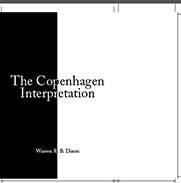
 |
The title of Dixon’s book is the name of a frequently taught theory of quantum mechanics. Don’t let that put you off. You’re actually not going to encounter a dry dissertation. On the contrary, you’re about to be swept into a current of intrigue and mystery told with adroitness and aplomb.
The novel’s narrator, Austin, is a thirty-something American expat poet getting by in Heidelberg through the grace of a family trust. He meets a fellow countryman, Paul, in a coffee shop. Paul asks Austin to accompany him as he meets a heretofore-unknown relative. The relative has an exquisite woman, Monica, with him. And so begins a fascinating tale of obsession and possession, guilt and lost innocence, mayhem, murder, blackmail, terrorism, retribution, revenge, and more. It’s a veritable cornucopia of vices spilled strategically to elicit maximum involvement.
Dixon is both an erudite and intoxicating storyteller. His descriptions of damp German cites leave you chilly. His examination of conflicting motivations and behaviors paint empathetic portraits of human foibles. His sequential revelations of ever-increasing evil keep you turning pages to find out not simply what will happen next, but also who’s really responsible and why.
In his recounting of this strange and haunting tale, the author also has his narrator comment on his own narration. This technique adds the perspective of hindsight that is appropriately devoid of condescension. This is the rare novel that assumes a level of intelligence on the part of the reader if not equal to at least commensurate with that of the writer. If you appreciate such an assumption, chances are you’ll appreciate this work.